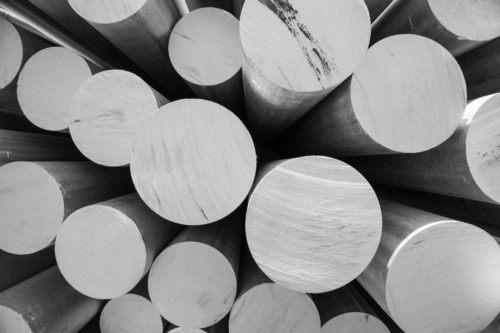Not known Details About Stahl Specialty Company
Not known Details About Stahl Specialty Company
Blog Article
What Does Stahl Specialty Company Do?
Table of ContentsThe Main Principles Of Stahl Specialty Company The Ultimate Guide To Stahl Specialty CompanyStahl Specialty Company Fundamentals ExplainedFacts About Stahl Specialty Company RevealedWhat Does Stahl Specialty Company Do?
There are numerous small differences in between functioned and cast aluminum alloys, such as that actors alloys can contain extra considerable quantities of various other metals than functioned alloys. Yet one of the most noteworthy distinction in between these alloys is the manufacture process whereby they will go to supply the last product. Apart from some surface area treatments, cast alloys will leave their mold and mildew in nearly the specific solid type wanted, whereas functioned alloys will undergo a number of alterations while in their solid state.If you think that a functioned alloy might be the finest for your task, take an appearance at some of our posts that explain even more about specific functioned alloys, such as Alloy 6061 and Alloy 6063. On the various other hand, if you believe an actors alloy would certainly be better for you, you can discover more about some actors alloys in our Alloy 380 and Alloy 383 write-ups (coming quickly).

Having the experience and industry expertise to engineer your castings for optimal production and quality outcomes will enhance the project. Producing aluminum spreading requires a complicated collection of procedures to achieve the appropriate results. When picking a new light weight aluminum factory to partner with, ensure they have extensive market experience and are experienced about all facets of the light weight aluminum casting process: layout, production, material analysis, and product testing.
The Single Strategy To Use For Stahl Specialty Company
The foundry should also have a proven record of delivering outstanding items that meet or surpass consumer assumptions. Quality assurance needs to additionally go to the top of your checklist when choosing a light weight aluminum shop. By functioning with a certified factory who complies with the standards for quality assurance, you can secure the integrity of your item and guarantee it meets your requirements.
By selecting a firm that uses services that fulfill or exceed your product requirements, you can be sure that your project will be finished with miraculous accuracy and efficiency. Certain aluminum foundries concentrate on certain sorts of making processes or casting methods. Various components require different manufacturing techniques to cast light weight aluminum, such as sand spreading or pass away spreading.

Pass away spreading is the name offered to the procedure of developing intricate steel components through use molds of the part, likewise referred to as passes away. The process makes use of non-ferrous metals which do not include iron, such as aluminum, zinc and magnesium, as a result of the preferable residential or commercial properties of the metals such as low weight, greater conductivity, non-magnetic conductivity and resistance to deterioration.
The Ultimate Guide To Stahl Specialty Company
Pass away spreading production is fast, making high manufacturing degrees of parts very easy. It creates more parts than any type of various other procedure, with a high level of accuracy and repeatability. For more information concerning die casting and pass away casting materials used at the same time, read on. There are three sub-processes that drop under the classification of die spreading: gravity die casting (or permanent mold and mildew casting), low-pressure die casting and high-pressure die spreading.
Regardless of the sub-process, the die spreading process can be damaged down into six actions. After the pureness of the alloy is checked, passes away are produced. To prepare the needs casting, it is vital that the dies are tidy, so that no deposit from previous manufacturings continue to be. After cleaning, the ejection lubrication is related to the die to make sure a smooth launch.
The pure steel, also referred to as ingot, is included in the heater and kept at the molten temperature level of the metal, which is then transferred to the injection chamber and infused right into the die. The stress is then kept as the metal solidifies - Foundry. Once the metal strengthens, the cooling process begins
The thicker the wall surface of the part, the longer the cooling time as a result of the amount of indoor steel from this source that likewise needs to cool. After the part is totally cooled down, the die halves open and an ejection system pushes the component out. Following the ejection, the die is closed for the next shot cycle.
The Ultimate Guide To Stahl Specialty Company

Today, leading manufacturers make use of x-ray screening to see the entire interior of parts without cutting right into them. To get to the completed item, there are three key alloys used as die spreading product to select from: zinc, aluminum and magnesium.
Zinc is one of the most pre-owned alloys for die spreading because of its reduced expense of resources. It's additionally among the stronger and stable steels. Plus, it has outstanding electrical and thermal conductivity. Its corrosion resistance additionally enables the components to be long-term, and it is among the more castable alloys due to its lower melting factor.
Stahl Specialty Company Fundamentals Explained
As mentioned, this alloy is among one of the most commonly used, yet manufactures will, at times, choose light weight aluminum over zinc due to aluminum's manufacturing advantages. Light weight aluminum is extremely cost-effective and one of the extra flexible alloys. Light weight aluminum is used for a number of different products and sectors anything from home window frameworks to aerospace materials.
Report this page